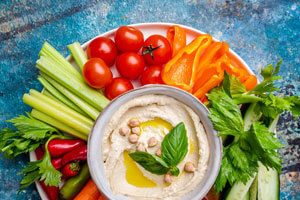Plant-based Protein Made Easy

What does it mean to be plant-based? It means you’re choosing to get most of your food from plant sources. The Director of the Department of Nutrition at Brigham and Women’s Hospital and Harvard Health contributor, Katherine D. McManus, MS, RD, LDN, explains:
“This includes not only fruits and vegetables, but also nuts, seeds, oils, whole grains, legumes, and beans. It doesn’t mean that you are vegetarian or vegan and never eat meat or dairy. Rather, you are proportionately choosing more of your foods from plant sources.”
If you’ve considered reducing your meat or dairy intake (Meatless Monday perhaps?), you may be wondering how to get adequate protein when your main sources are eliminated.
Here are 10 sources of plant-based protein that are easy to incorporate into your meals today: Lentils, chickpeas (think: hummus), nuts, quinoa, tofu, steel-cut oats, chia seeds (toss in a smoothie), beans with rice, potatoes, and leafy greens.
Trouble Sleeping? Get Outside!

The amount of sleep we get greatly impacts every aspect of our daily lives, from our mood to our energy to our body’s natural healing abilities. And it’s no surprise that a lot of us are having trouble sleeping given the current worldwide health crisis.
So what can we do today to better prepare our bodies for a restful night’s sleep? Get outside.
Studies show that exposure to sunlight “helps calibrate your body’s circadian “clock”, which regulates everything from appetite and sleep schedules to mood and energy levels.”
One of the best ways to calibrate our internal clock is by spending about 45 minutes outdoors each day, ideally in the morning. Even on a cloudy day or covered up with sunglasses and protective clothing, we still get enough natural light just being outdoors to reap the benefits.
Plus, who couldn’t use a walk in the fresh air to clear their head?




